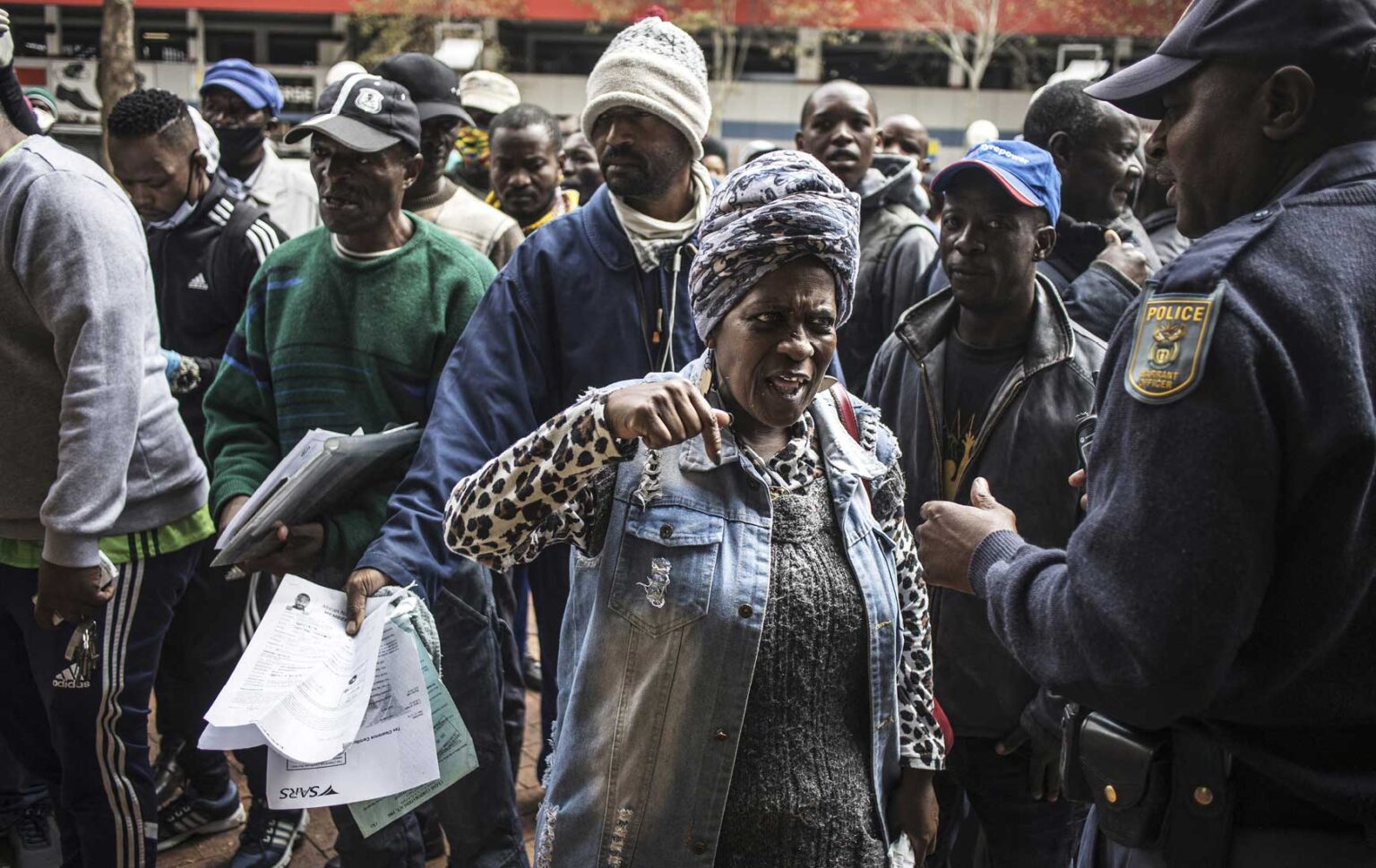Will African cities recognise the vital role of informal traders?
By the beginning of July 2020, the COVID-19 pandemic had gripped the world, shutting down much of what had previously been taken for granted. Perhaps more significantly, it had laid a deep sense of trepidation on the world.
On the fifth of the month, police raided the Jambanja, Unit L, market in the town of Chitungwiza in Zimbabwe. This had become commonplace: the authorities had instituted lockdown measures that severely restricted activity, and informal traders had been blamed for spreading the disease. The vendors attempted to salvage their stock and evade arrest, but the police action was especially aggressive. Boarding his vehicle, vendor Samson Chamunorwa Zharare suffered a bullet wound to his leg. He was dumped at a hospital, where the leg was nearly amputated.
Zharare’s fate was emblematic – if hyperbolically so – of the plight of much of the continent’s informal sector under COVID-19. The demolished stalls and bullets fired in Chitungwiza were matched elsewhere, for example, as bulldozers smashed stalls at the Redlight market in Paynseville in Liberia, or in reports of soldiers flogging errant traders in Nigeria.
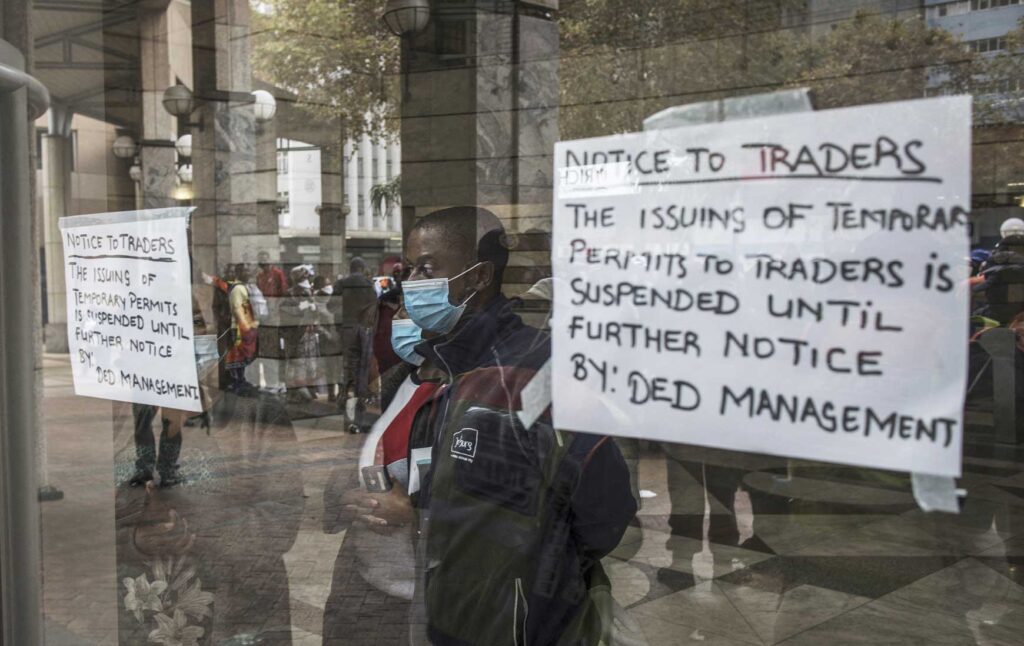
All of this came atop the damage to livelihoods that many traders endured as a result of the measures taken to combat the virus – particularly the “lockdowns” that restricted movement and activity. These limited the number of customers who could be served, limited the space that traders could operate in, and limited trading hours – or in some instances made it illegal to trade at all, as was the case in Zimbabwe. As many informal traders survive off their daily income and have scant savings, even short periods of enforced inactivity can result in financial ruin.
Samuel Waweru, secretary of the Nairobi Informal Sector Confederation, gave Africa in Fact a flavour of this: “Immediately the epidemic was declared in the country, the government initiated strict health protocols, most of which were not favourable to the sector – especially the curfew and the lockdowns. Social distancing was impossible to practice. The higher costs of sanitisers, water and so on were not affordable, which led to harassment and confiscation of wares, leading to arrests on the streets and working spaces.” These circumstances have taken a toll on traders’ personal lives, too.
Africa’s informal sector is a significant contributor to the continental economy. A study by Leandro Medina and Friedrich Schneider – of the International Monetary Fund and University of Linz respectively – put the size of the informal sector in sub-Saharan Africa at an average of some 39% of GDP between 1991 and 2017 (34.4% over the past decade). Across countries, the informal sector’s contribution ranges from close to 57% in Nigeria, 56% in Tanzania and 54% in Zimbabwe at the higher end, to 31% in Cameroon, 30% in Lesotho and 27% in South Africa at the lower end. Yet even the latter set of estimates, bespeaking relatively smaller informal economies, points to huge volumes of economic activity taking place outside the regulation of the continent’s state institutions.
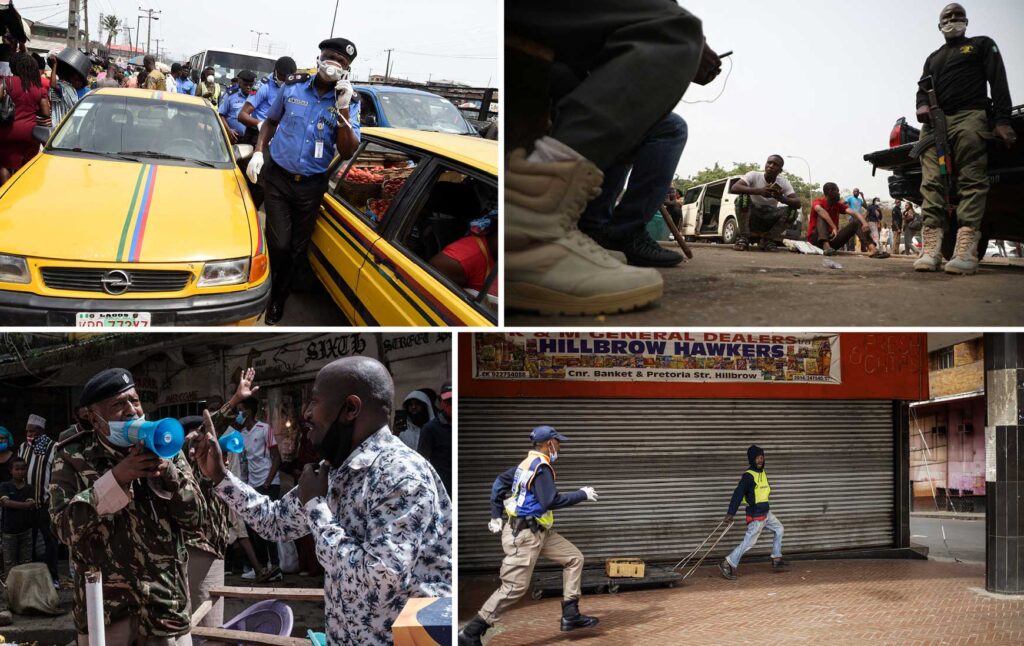
Perhaps more important than the scale of the economic contribution of the informal sector is that it underwrites the livelihoods of millions of households. The International Labour Organizsation (ILO) has put employment in sub-Saharan Africa’s informal sector at some 66% of the total, excluding agricultural employment. Among women and young people, informal sector employment is the overwhelming mode of economic participation; four young people are employed in Africa’s informal economy for every one in the formal. For women as a whole, the proportion is only slightly lower.
Traders, of course, comprise only one element of this informal economy, but it is a crucial one. Not only are the barriers to entry relatively low – providing a realistic opportunity for millions of people to have a chance at economic activity – but informal trade is the nutritional lifeline of most of the continent’s population. This is the case not least in Africa’s burgeoning cities, which embody the discordant confluence of rapidly growing prosperity and deep-seated economic retardation.
Danielle Resnick of the International Food Policy Research Institute in Washington DC has written that, “In many African cities, the informal economy has long been the linchpin of food security for the urban poor. Despite the trend of supermarket expansion in the region, the urban poor continue to depend heavily on informal markets and street vendors for daily purchases, and use supermarkets only periodically for bulk purchases of staples. Most of the eggs, fish, meat, and milk sold to the poor in urban Africa are from informal markets. In countries such as Côte d’Ivoire, Kenya, Mali, and Uganda, 80% to 90% of raw milk is purchased from vendors or small-scale retailers. More broadly, a survey of more than 6,000 households in low-income neighbourhoods in 11 African cities found that 70% of urban households regularly purchase their foods from the informal market or street vendors.”
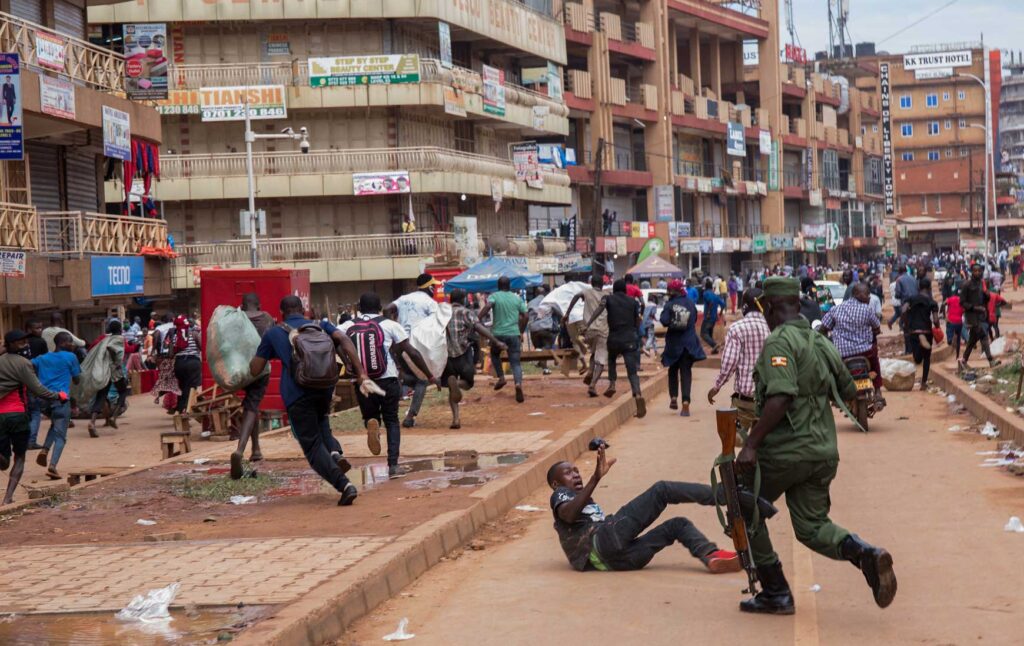
Given the importance of informal trading, what explains the hammering the sector received across so much of the continent during the pandemic? Why, when already fragile economies were pushed to the brink, jeopardising the livelihoods of its traders and the communities they served, did many governments choose to compound this by acting with an iron fist against them?
Streetnet, a global organisation advocating for the rights of informal traders pointed out to Africa in Fact that such harassment – sometimes violent and, given the high proportion of women doing this work, with a distinctly gendered aspect – is not a new phenomenon. Rather, “it is a persistent issue that intensified during the pandemic”.
Indeed, the relationship of the African state and its informal economy has long been a complicated and contested one, especially in the case of the continent’s cities.
Africa’s cities are largely an inheritance of the colonial past. Built (or developed) as centres of administration and commerce, their function was typically to sustain and service a relatively small elite. For the most part, they were not set up to handle mass migration, nor was an industrial base developed that might have absorbed such an influx.
Africa’s cities are the continent’s statement of modernity. They are countries’ windows on, and showcases to, the outside world. In many respects, they are the locus of political and economic power, both for long-standing political and bureaucratic elites and the growing middle class.
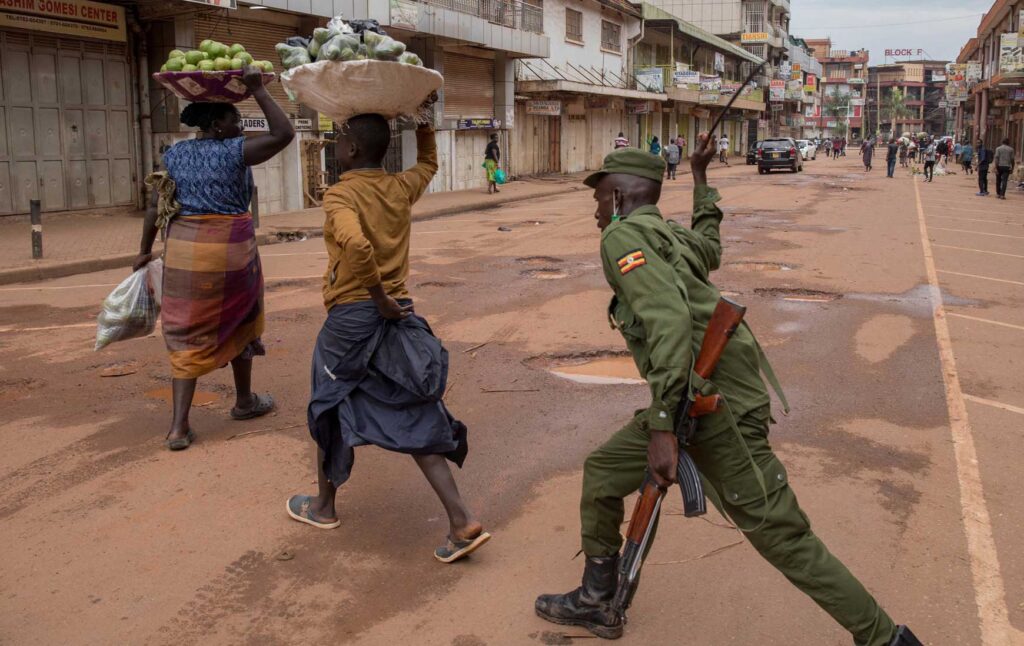
The presence of informal economies sits ambiguously and unambiguously in this environment, and the trader – the “street trader” – is one of the most visible signifiers of this. Most obviously, their activities challenge the conception of order that is assumed to be a natural corollary of the modern world. Their visibility on the African streetscape sends a powerful aesthetic message about the state of the continent’s urban centres, and the ability of the state to enforce its will. Periodically, officialdom acts.
Prior to the pandemic, informal traders in various urban centres had been subjected to crackdowns on the grounds of public order. In 2018, for example, the then minister of Kampala Capital City Authority (Uganda), Beti Kamya, announced a crackdown thus: “The public has a duty to abide by the set regulations. We cannot have a well-organised city with everybody ignoring laws.”
Similar justifications have been invoked in other contexts, such as a crackdown on traders in Zambia in the wake of a cholera outbreak in 2017.
Official hostility towards informal trading is compounded by the hard reality that enforcement of policy puts it in the hands of compromised institutions and their agents. Traders may make a meagre income, but the goods they sell, and the cash they have on hand, nevertheless attract covetous and abusive officials. Human Rights Watch has documented the freewheeling and extortionate behaviour of Angola’s security forces in implementing unsympathetic policies in a 2013 report, ‘Take That Filth Away’: Police Abuses Against Street Vendors in Angola. Although the abuse of traders is typically not lethal, in early 2020 a police officer was convicted of killing a mother of three during a raid on a Luanda market.
Foreign traders, who may or may not be lawfully in the host country, are particularly vulnerable to abuse.
On top of this, political sentiment sometimes comes into play. Informal traders constitute a political constituency of sorts. State attitudes and actions towards informal traders, as Danielle Resnick has argued, depend on the specific political and institutional arrangements in a given context. Where they are regarded as inclined towards the political opposition, repression follows.
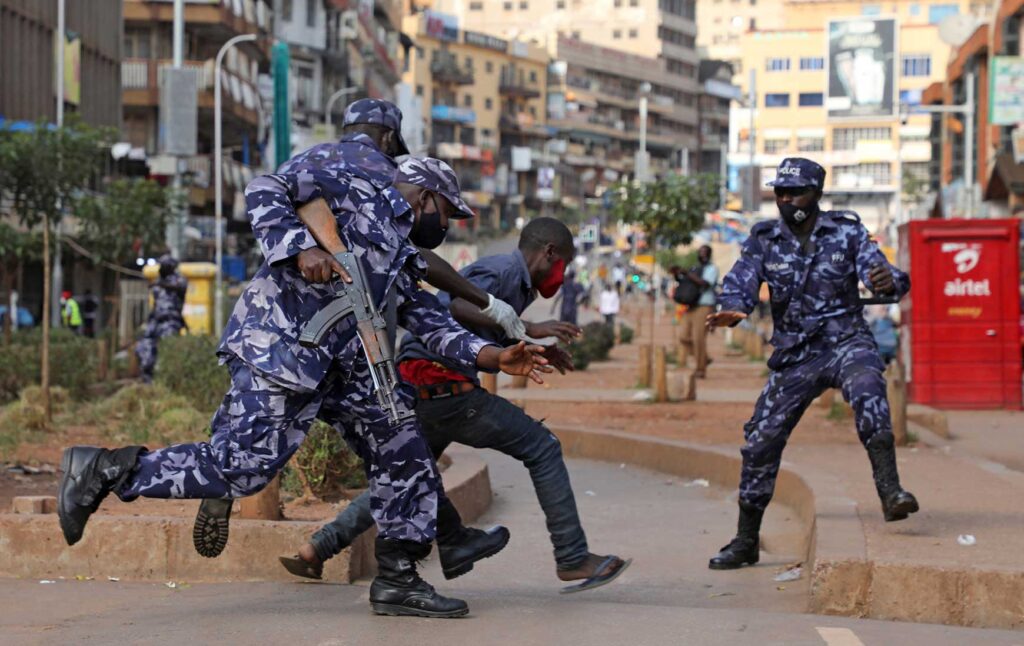
This goes back generations. In one notorious case, following the 1979 coup that brought Flight Lieutenant Jerry Rawlings to power in Ghana, a campaign was launched against the country’s market women, who were accused of undermining the country, profiteering and so on. In 2005, informal traders in Zimbabwe were targeted by a vengeful government in its Operation Murambatsvina (‘Move the Rubbish’) – which was widely held to have been intended as punishment for opposition-inclined urban communities.
Sally Roever, the international coordinator of Women in Informal Employment: Globalizing and Organizing (WIEGO), a United Kingdom-based body bringing together organisations representing women in the informal sector, commented at a recent webinar: “The state, national governments and local governments are common sources of violence; vested interests of intermediaries, money lenders, property owners, landlords, those sorts of actors, are often identified by workers in our network as sources of violence; criminal actors, even fellow workers, people’s own household and community, and also the general public. So, there is a whole range of sources of violence that affect informal workers.”
The COVID-19 crisis presented a once-in-a-generation opportunity for governments to impose controls on their societies, with a respectable rationale for doing so. But this expanded latitude held the potential to be used to pursue objectives other than the safeguarding of public health. These would frequently extend pre-existing policy.
Liesl Louw-Vaudran of the Institute of Security Studies wrote of the dangers of this in Africa, as the continent’s democratic life had been on a concerning track: “This is increasingly difficult on a continent where the space for civil society is shrinking. Now the pandemic has given security forces and authoritarian governments free rein – out of sight of opposition parties and human rights defenders – to prey on citizens, especially those who disagree with them.”
She wrote this in June 2020. The following month Samson Chamunorwa Zharare was shot in the Jambanja market.
For many of the continent’s informal workers, the pandemic compounded an already difficult situation. But perhaps their accumulated experience prepared them for this, and they did what was possible under the circumstances. An important part of this was the mobilisation of existing traders’ organisations. Streetnet reports: “It has been very challenging, but yes, informal traders had no option other than adapting. Not only adapting, but in many cases being the first responders to support members of their own organisations. Informal traders have taken an active role in raising awareness of health risks and prevention measures, going as far as monitoring and disinfecting markets. They have also developed advocacy initiatives and fund-generating activities for the survival of their members.”
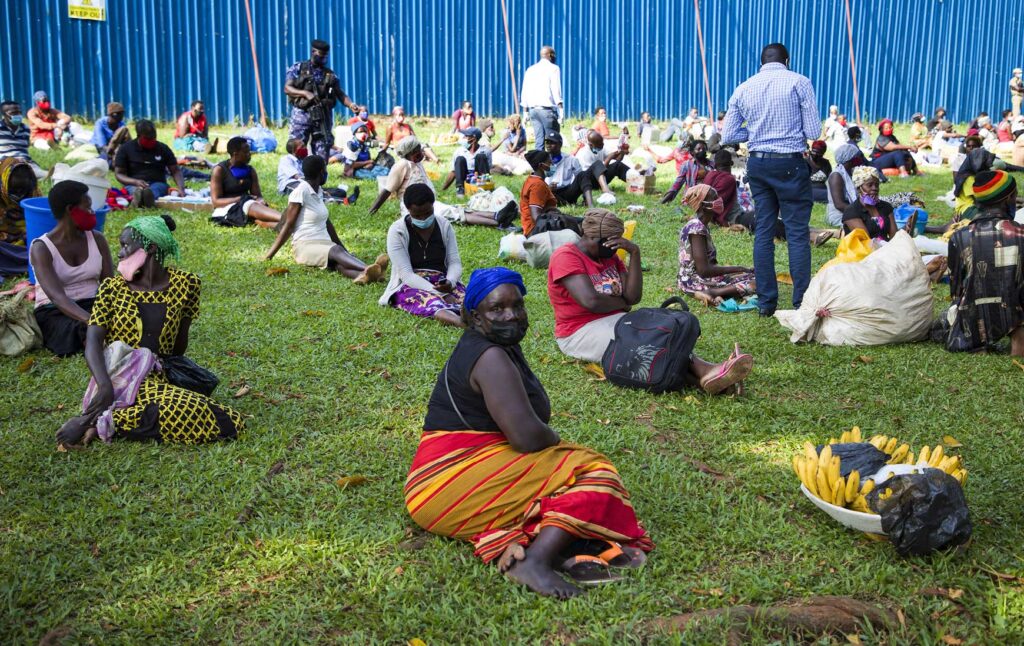
The strengthening of traders’ organisations could be an important step in the creation of lobby groups, which could begin to push lawmakers towards a more sympathetic posture towards this sector of the economy that has traditionally been poorly represented in the corridors of power.
Additionally, the pandemic forced some governments to accept the important role that many informal traders play in providing everyday goods and in supporting low-income families. In Sierra Leone, for example, the government recognised the role informal traders could play in enforcing health regulations and helped them to establish stores that complied with the new regulations. In Ghana, the government stepped in to mitigate risks in markets by regularly disinfecting them.
This is far from universal. In South Africa, a study of the impact of COVID-19 and government support programmes in the country – carried out by the business research group SBP – argued that aid schemes were often geared to the highly controversial goal of formalising informal trading. Interestingly, in 2013 a Licensing of Businesses Bill was introduced, which would have demanded licences for pretty much all commercial activity. The continuities are clear and depressing.
It is fair to say that the position of informal traders in Africa’s cities remains marked by contradictions. Samuel Waweru describes the situation in Kenya as being largely more of the same. Despite the rhetoric about social distancing, he notes the irony that people continue to be arrested and transported in vehicles where such distancing is impossible. Informal traders remain vulnerable to fines and harassment. On the other hand, new draft legislation – dating from before the pandemic – would introduce a more agreeable regime for informal trading. The pandemic and pending elections have, however, delayed its passing.
Perhaps most importantly, to use Streetnet’s formulation, it is important that African governments “‘recognise the critical role informal worker organisations have played in the COVID-19 relief effort and must play in recovery.”
Ultimately, this is the keystone of the future for informal traders. Will the cities that they serve accept their permanence and the critical role they play? Or will they see in the COVID-19 pandemic an opportunity to exclude them further? The case of Samson Chamunorwa Zharare is a reminder that the latter option is an uncomfortable possibility.
This article first appeared in Africa in Fact, Issue #59, October – December 2021

